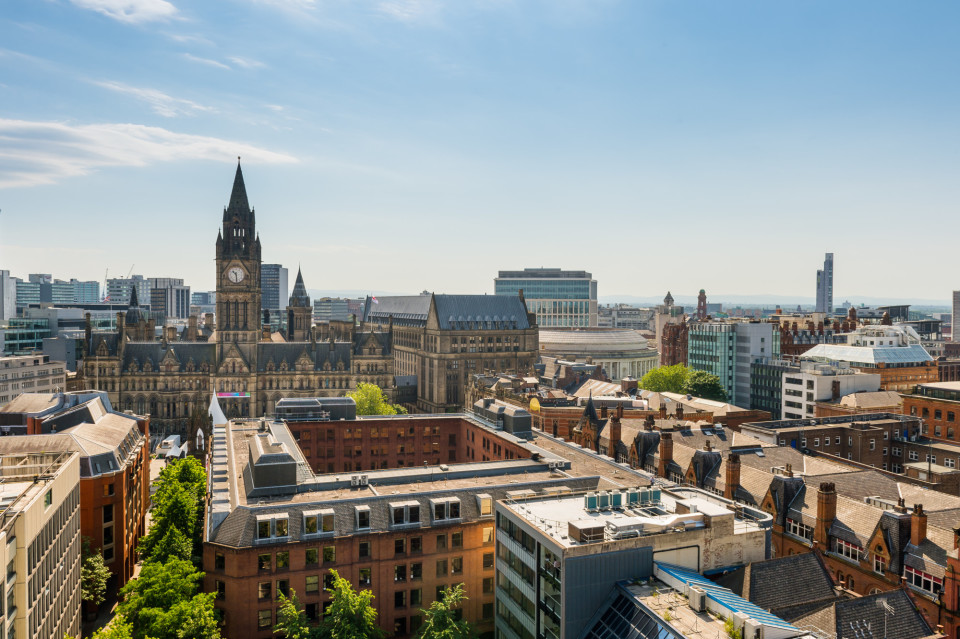World Green Building Week pandemic impact climate crisis
By Bruntwood Works

Before the coronavirus pandemic began earlier this year, there had been a seismic shift in the emphasis being placed on the climate crisis. From the melting of the ice sheets to fires in the Amazon rainforest, every corner of the globe is being affected by climate change.
While it might not have been top of the news agenda during the height of lockdown, the climate crisis was still just as significant. And as countries across the world halted, with people confined to their homes and many businesses closed, analysis grew of the impact this was having on carbon emissions worldwide.
The impact of lockdown on the UK’s carbon footprint
A study by the Carbon Trust showed that carbon emissions from the UK’s main consumer industries fell by a quarter during the national lockdown, as people spent more time at home and cut down on their spending. That equates to a total reduction of 4.3m tonnes, when compared to the same time period in 2019.
The biggest portion of the emissions cut came from travel, with fewer people taking flights, and spending less money on vehicle fuel and commuting. This reduction in travelling also managed to offset the rise in carbon caused by more people using delivery services from supermarkets and online stores.
Impact on Earth Overshoot Day
This year, Earth Overshoot Day fell on 22nd August, marking the date when humanity’s demand for ecological resources and services in a given year exceeds what Earth can regenerate in that year.
The date this year fell three weeks later than in 2019, due to a 14.5% reduction in carbon footprint across the world, and an 8.4% reduction in the forest product footprint.
While this is welcomed, it is still not enough. This was merely an accidental reduction due to lockdowns across the globe, and it is simply not sustainable. If we are to only use what the Earth can regenerate every year, then this needs to be through action, not because of a disaster.
The scale of the problem
All this being considered, climate change has not stopped for Covid19. According to a United in Science report, greenhouse gas concentrations in the atmosphere are at record levels and continue to increase. Despite the decline in carbon emissions that we saw during national and global lockdown emissions are heading back towards pre-pandemic levels.
At present, the world is not on track to meet the agreed targets to keep global temperature increases below 2 °C or at 1.5 °C above pre-industrial levels.
Why we need to act now
The decline and subsequent quick increase just shows how necessary it is that we take long-term, drastic action in order to tackle the climate crisis. Sustainable development is just one part of this, but a part we know we can create real change and massively reduce our carbon footprint as a business.
This means ensuring new developments are constructed and operate at net zero carbon; that our existing buildings have infrastructure and changes needed to operate at net zero carbon; and we use our position within our regions to influence real change that impacts individuals and communities and creates more sustainable regions and planet.
What we can learn from lockdown restrictions
It is vital that we take what we have learnt during the pandemic, and ensure that we focus our efforts on a green recovery. Only through sustained and drastic measures can we meet the targets set in the Paris agreement.
And that goes for us all as individuals, as well as businesses and government. There are changes we can all make, leading on from the changes we made through lockdown. For example, many people are taking more active commutes, cycling, running or walking to work, to reduce the strain on public transport and the roads as businesses start heading back to the office.
And with travel restrictions in place for many countries, staycations have become the new norm. If this is to carry on into years to come, then we will see a huge reduction in carbon emissions with less people taking flights abroad.And the same goes for international business meetings too. Again, the likes of Zoom and Microsoft Teams (other conferencing services are available) has shown that we don’t necessarily all need to be in the same place at the same time.
It is crucial that the climate crisis remains a key focus. It cannot be ignored, or put on hold until the pandemic is over. We must act now to secure a greener, more sustainable future.
Stay Connected!
Sign up to our newsletter for the latest news, updates and offers.